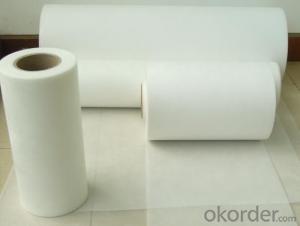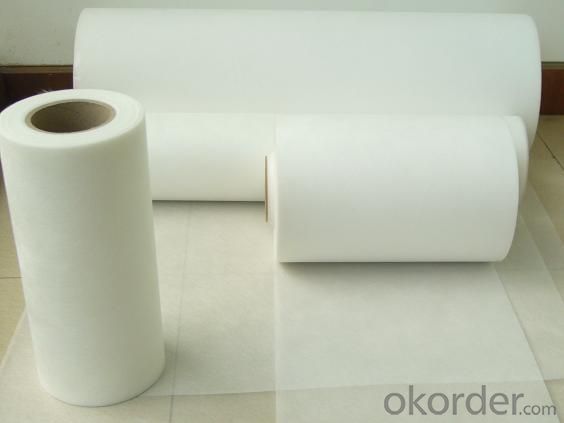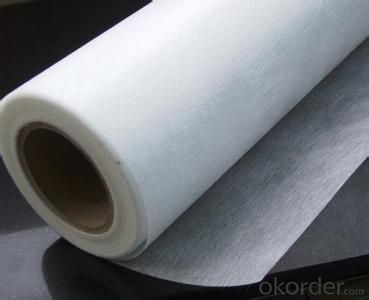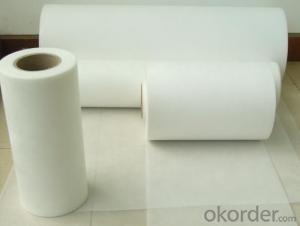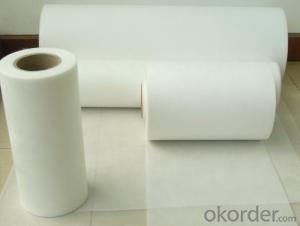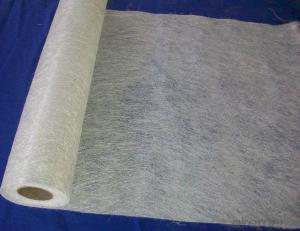Fiberglass Mat Tissue E-Glass/C Glass Fiber Glass Surface Tissue Mat
- Loading Port:
- Qingdao
- Payment Terms:
- TT or LC
- Min Order Qty:
- 144000 m²
- Supply Capability:
- 1440000M2 Per Month m²/month
OKorder Service Pledge
OKorder Financial Service
You Might Also Like
1.Brief Introduction1.Brief Introduction
Surfacing Tissue mainly used in the surface layers of FRP products. It features even Fiber distribution, soft feel, level and smooth fiber surface, less glue content, quick resin soak and good pattern fitness. It can improve the product surface property on corrosion resistance, compressive strength, seepage resistance, and longer service life. It is also suitable for spraying; pattern pressing and other FRP pattern technology.
2.Characteristics
Fast breakdown in styrene
Fiber dispersed evenly
Low binder content
Superior acid corrosion resistance
3.Specifications
Item | Unit | Specification |
Area Weight | g/m2 | 30+/-3 |
Binder Content | % | 6-9 |
Tensile Strength MD | N/125px | ≥35 |
Soaking time | S | ≤10 |
Moisture content | % | ≤0.5 |
Width length
| mm
| 1270
|
Roll Diameter
| m | 300
|
Paper Core Internal Dia | mm | 76 |
Special specification can be produce according to customer requirements.
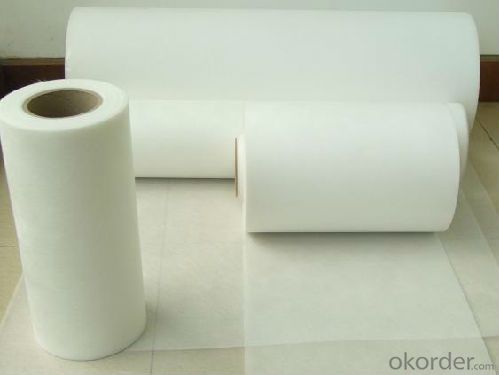
4.FAQ
a.Pacage
Each Surface Tissue is wound onto a paper tube which has an inside diameter of 76mm and the mat roll has a diameter of 330mm. The mat roll is wrapped up with plastic film,and then packed in a cardboard box or wrapped up with kraft paper. The rolls can be vertically or horizontally placed. For transportation, the rolls can be loaded into a cantainer directly or on pallets.
b.Product storage:
Unless otherwise specified, Chopped Strand Mat should be stored in a dry, cool and rain-proof area. It is recommended that the room temperature and humidity should be always maintained at 15℃~35℃ and 50%~75% respectively.
- Q: Is fiberglass mat tissue resistant to oil and grease?
- Yes, fiberglass mat tissue is resistant to oil and grease.
- Q: How long does fiberglass mat tissue last?
- The lifespan of fiberglass mat tissue can vary depending on various factors such as its quality, usage, and exposure to external conditions. Generally, fiberglass mat tissue is designed to be highly durable and long-lasting. When properly installed and maintained, it can typically last for several decades. However, it is important to note that fiberglass mat tissue can deteriorate over time due to environmental factors such as UV exposure, moisture, and temperature fluctuations. Continuous exposure to harsh weather conditions, extreme temperatures, or chemicals can accelerate the degradation process. To maximize the lifespan of fiberglass mat tissue, it is crucial to follow the manufacturer's guidelines for installation, maintenance, and periodic inspections. Regular inspections can help identify any signs of wear, damage, or degradation early on, allowing for timely repairs or replacements. It is recommended to consult with a professional or the manufacturer for specific information regarding the expected lifespan of a particular fiberglass mat tissue, as it can vary depending on the specific product and its intended application.
- Q: Can fiberglass mat tissue be used for bridge deck rehabilitation?
- Yes, fiberglass mat tissue can be used for bridge deck rehabilitation. Fiberglass mat tissue is a versatile material that is known for its high strength and durability. It is commonly used in construction projects, including bridge deck rehabilitation, due to its ability to reinforce and strengthen existing structures. Bridge deck rehabilitation involves repairing and restoring the deck of a bridge that has deteriorated over time. This process typically involves removing the existing damaged concrete, applying a new layer of concrete, and reinforcing it with materials such as fiberglass mat tissue. Fiberglass mat tissue is often used as a reinforcement material in bridge deck rehabilitation due to its excellent mechanical properties. It has high tensile strength, which helps to increase the load-bearing capacity of the bridge deck. Additionally, it is resistant to corrosion, which is particularly important in bridge decks that are exposed to harsh weather conditions and chemicals. Furthermore, fiberglass mat tissue is easy to install and can be applied to bridge decks of various shapes and sizes. It can be embedded into the new concrete layer during construction or applied as an overlay on the existing deck. This flexibility makes it an ideal choice for bridge deck rehabilitation projects. In summary, fiberglass mat tissue can indeed be used for bridge deck rehabilitation. Its high strength, durability, and resistance to corrosion make it a suitable reinforcement material for repairing and strengthening bridge decks. Its ease of installation and versatility further contribute to its suitability for this application.
- Q: What is the moisture resistance of fiberglass mat tissue?
- The moisture resistance of fiberglass mat tissue is high.
- Q: How does fiberglass mat tissue perform in terms of thermal conductivity?
- Fiberglass mat tissue performs well in terms of thermal conductivity. Due to its composition of fine glass fibers, it has a low thermal conductivity value, meaning it is a good insulator against heat transfer. The interlocking fibers create a barrier that slows down the movement of heat, making it an effective material for thermal insulation applications. Additionally, the mat tissue is often combined with other materials, such as binders or coatings, to enhance its thermal resistance properties. Overall, fiberglass mat tissue is a reliable choice when it comes to minimizing thermal conductivity and providing insulation in various industries and applications.
- Q: Does fiberglass mat tissue require any special precautions during transportation?
- Yes, fiberglass mat tissue does require special precautions during transportation. Fiberglass mat tissue is a delicate material that can easily get damaged if not handled properly. Therefore, it is important to take certain precautions to ensure its safe transportation. Firstly, the fiberglass mat tissue should be packed in a sturdy and durable packaging material that can protect it from any external impacts or vibrations. This can be achieved by using heavy-duty cardboard boxes or wooden crates that provide adequate cushioning and support. Additionally, it is crucial to label the packaging clearly as "Fragile" or "Handle with Care" to alert the handlers about the delicate nature of the product. This will help prevent any mishandling or rough treatment during transportation. Furthermore, fiberglass mat tissue should be stored and transported in an upright position to minimize the risk of any bending or folding that could potentially damage the material. It is also important to avoid stacking heavy objects on top of the fiberglass mat tissue to prevent any unnecessary pressure or crushing. Lastly, it is advisable to use secure and reliable transportation services that have experience in handling delicate materials like fiberglass mat tissue. This ensures that the product is transported with utmost care and attention, reducing the chances of any damage during transit. By following these special precautions, the risk of damage to the fiberglass mat tissue during transportation can be significantly minimized, ensuring that it reaches its destination in perfect condition.
- Q: Can fiberglass mat tissue be used for wind turbine blades?
- Indeed, wind turbine blades can utilize fiberglass mat tissue. This material, known for its lightness and durability, finds widespread use in constructing wind turbine blades. It boasts an impressive strength-to-weight ratio and possesses resistance against corrosion, making it an optimal choice for enduring the harsh environmental circumstances faced by wind turbine blades. Moreover, fiberglass mat tissue can effortlessly be shaped into intricate forms, enabling the production of aerodynamically efficient wind turbine blades. All in all, integrating fiberglass mat tissue into wind turbine blades enhances their performance and longevity.
- Q: Is fiberglass mat tissue suitable for insulation in residential buildings?
- Yes, fiberglass mat tissue is suitable for insulation in residential buildings. It is a widely used and effective insulation material that offers excellent thermal performance, soundproofing capabilities, and fire resistance. Additionally, it is easy to install, durable, and does not degrade over time.
- Q: Can fiberglass mat tissue be used for insulation in research laboratories?
- Yes, fiberglass mat tissue can be used for insulation in research laboratories. It is a common material choice due to its excellent thermal insulation properties and fire resistance. Additionally, fiberglass mat tissue is lightweight, durable, and easy to install, making it suitable for various insulation applications in laboratories.
- Q: Is fiberglass mat tissue water-resistant?
- Yes, fiberglass mat tissue is water-resistant.
Send your message to us
Fiberglass Mat Tissue E-Glass/C Glass Fiber Glass Surface Tissue Mat
- Loading Port:
- Qingdao
- Payment Terms:
- TT or LC
- Min Order Qty:
- 144000 m²
- Supply Capability:
- 1440000M2 Per Month m²/month
OKorder Service Pledge
OKorder Financial Service
Similar products
Hot products
Hot Searches
Related keywords
